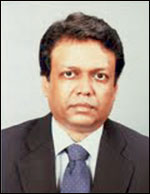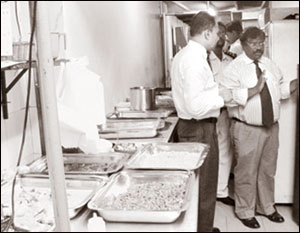Medical checks mandatory in hotel industry
By Ranil WIJAYAPALA
|

Dr. Pradeep Kariyawasam
|
Sri Lankan hospitality, tasty food served at hotels, restaurants and
other food outlets coupled with its serene beauty may be major factors
to attract tourists to this small island as it breathes the fresh air of
freedom after rising from the ashes of the decades long conflict. The
booming tourism industry has paved many avenues for the country to reap
the true dividends of peace.
But, can we allow hoteliers, restaurant keepers and fast food
handlers to ruin the industry, by allowing them to stick to the same old
standards. Such freedom will definitely push the tourism industry to its
lowest ebb, if they turn those tourist attractions into centers of food
poisoning and for the spread of communicable diseases, bringing
disrepute to the country.
So the time is ripe for authorities to take stern measures to
maintain high standards in the hotel industry and also in city food
outlets.Contaminated food is found in star class hotels and food outlets
which have received awards for food hygiene. Authorities concerned
should consider withdrawing 'crowns' given to some hoteliers.
As a step towards improving the hygiene level of hotels, restaurants
and food outlets, the Public Health Department (PHD) of the Colombo
Municipal Council has made it mandatory for hotel workers, to have
medical check ups.According to the Chief Medical Officer (CMO) of the
PHD, Dr. Pradeep Kariyawasam, this is not a new thing they are going to
implement. The Food Act of 1980 has made it mandatory that medical check
ups for cooks and serving staff. However, it has not specified what sort
of tests should be done.
"When we test food samples in our improved laboratories we found some
germs which are usually carried by humans in the food. We found such
germs even in the food samples of many Five star hotels. Therefore, we
thought that we should check workers, cooks and waiters", Dr.
Kariyawasam added.
It is difficult to get the management to agree on checking of staff
as they are focus on the outward beauty of the hotels and restaurants
rather than the health condition of their workers. The task is also a
big one considering that some 8,000 people work in more than 750 hotels,
restaurants and eating houses in the city."So we thought we should be
strict. We decided to take time to give trade licenses to them to
continue," Dr. Kariyawasam said.
The PHD has put new conditions for the renewing of trade licenses.
Workers have to be registered with the PHD and to get registration they
have to follow certain procedures," he said.
They have to undergo a simple training program on food health, will
be given a uniform which should be clean, and take the mandatory medical
check up. "For medical examination we take their blood, stool samples,
urine samples and we will test them for diseases they have", Dr.
Kariyawasam said.
|

Health officials inspecting a hotel kitchen |
The Colombo Municipal Council laboratory has been gazetted by the
Health Department for this purpose specially.
To implement this, the CMO has told all Food Inspectors and Public
Health Inspectors in the Colombo city to take the names of all workers
as hotel managements give only a few names when they ask for
names."Giving a few names won't make any impact.
They have to send the names of everyone working there because one
person can be a carrier of a disease," Dr. Kariyawasam said.Sometimes
hotel managements used to send only the most healthy workers for medical
check ups without sending the ones with diseases.
"Recently we experienced a hepatitis outbreak in hotels. It is
contagious and is carried through food or water that is supplied in the
hotel which we must investigate.If an employee has a contagious disease
and is detected they will be responsible for a food poisoning outbreak
or something like that, then the hotel will lose all its business. They
must understand this situation", Dr. Kariyawasam said.
The PHD of the CMC will check all workers once they undergo
training."Therefore they will be registered as food handlers and given
an identity card. Every year they will have to renew it", he added.
The identity card will permit them to work at any hotel or restaurant
in the city.
"If the hoteliers are not going to have certified workers we will
take the list and we will check. We won't be able to give them the trade
license to continue their service", he said.
The medical examination by any registered medical practitioner is OK
or else they can come to us for medical check ups", he added.
The CMC may not accept the lab test because some times they use Rapid
kits for these testings which have a lot of deficits. "We do our lab
test using conventional methods. It is a long procedure and it takes
time. If the lab test is done using conventional methods we can accept
the report", Dr. Kariyawasam said."When we check we always find
something wrong with those workers. When they bring the report it is
hundred per cent perfect.
All are healthy. We know there is something wrong. That is why we do
the checks ourselves", he added.
This is not a process to harass hoteliers and workers . The system
helps authorities to locate people with a disease . "When we find them
we have to investigate how he had got it. We can visit the hotels and we
can check the water supply to check for, he said.
It's typhoid or hepatitis it's from water, official also can check
the water supply for leakages where underground water is polluted.
Sometime main line water and sewer lines run parallel.
If there is a leakage in the sewerage it enters the water supply
because water pressure is very low in the city."We can investigate
things like that and correct the situation", he said.
"People should not think that we are harassing them. We are just
trying to put things right.
It is better to be safe by doing these checks voluntarily.
"If we go independently and find germs in the water or food samples
or infected persons working, we have to take them to Courts."We charge
for the testing. For smaller places we charge less and for the five
stars, we charge more as we have to do a lot of tests", he said.
Apart from this the PHD also will make it compulsory for food
handlers to have their chests X-rayed for TB."I had discussions with
Additional Secretary, Health Ministry Dr. Palitha Maheepala, Chest
Physician Dr. Kirthi Gunasekera and we have agreed that all these hotel
workers should get their chests X-rayed for TB", he said.
"It is serious as when they sneeze, cough or open their mouths they
can easily pass on TB to others.
We direct patients to a chest clinics in Borella. It will be done
free of charge. he added.According to Dr. Kariyawasam through these
check ups are done in Sri Lanka annually they are being done every six
months in other countries.
They check even for sexually transmitted diseases. "We don't do that,
but should.
We are do only basic investigations", the Dr.Kariyawasam said. |

